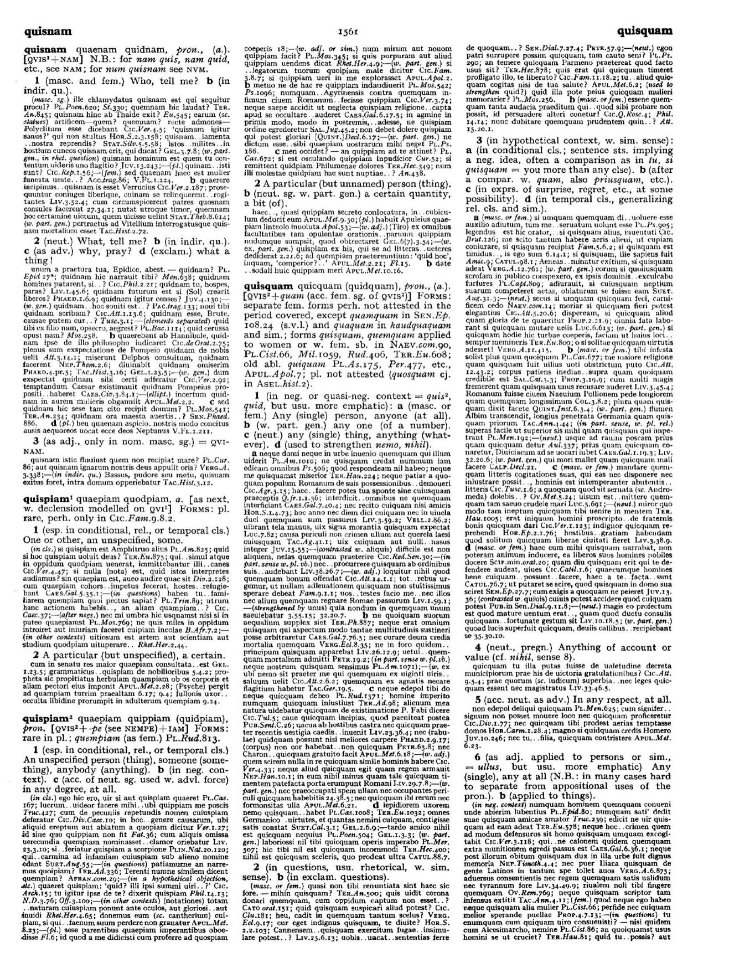
page_listing.tpl
page_subListingDetails.tpl
sub_listingDetails_style1.tpl
sub_listingDetails.title.tpl
quisquam, quidquam (or quicquam) anyone
quisquam, quidquam (or quicquam) is a Latin Pronoun that primarily means anyone.
Definitions for quisquam, quidquam (or quicquam)
Wheelock's Latin
Pronoun
- 1
indef. pron. and adj., anyone, anything
Oxford Latin Dictionary
Pronoun
- 1
(in neg. or quasi-neg. context = quis2, quid, but usu. more emphatic): (a) (masc. or fem.) Any (single) person, anyone (at all). (b) (w. part. gen.) any one (of a number). (c) (neut.) any (single) thing, anything (whatever). (d) (used to strengthen nemo, nihil).
- 2
(in question, usu. rhetorical, w. sim. sense). (b) (in exclam. questions).
Adverb
- 1
(acc. neut. as adv.) In any respect, at all.
Adjective
- 1
(as adj. applied to persons or sim., ~ullus, but usu. more emphatic. Any (single), any at all (N.B.: in many cases hard to separate from appositional uses of the pron.). (b) (applied to things).
Sentences with quisquam, quidquam (or quicquam)
Latin to English
Iūstitia numquam nocet cuiquam.Compare Justice never harms anyone.
Cum dēbēre carnufex cuiquam quidquam quemquam, quemque quisque conveniat, neget. (Ennius, fragment of a comedy) Compare Since the rascal denies that anyone owes anything to anyone, let each one sue the other.
Nemo vos, qui in hic concilium advoco, quisquam dico volo aut audeo.Compare No one of you, who have been summoned to this assembly, wishes or dares to say anything.
Neque ego ego hodie quisquam assumo, qui quisquam malevolens ius possum offendo.Compare Nor do I today arrogate anything to myself, which can fairly offend any the most malicious person.
Ego nec deus nec homo quisquam invideo.Compare No god or man envies us.
Nec nolo quisquam ego similis evado civis.Compare Nor are we unwilling that any citizen should turn out like ourselves.
Ego esse quicquam sceptra nisi vano putem fulgore tectum nomen et falso comam vinclo decentem?Compare Should I count sovereignty anything but a name bedecked with empty glamor, a brow adorned with a lying coronet?
Data sources
Notes
- Definitions
- Frederick M. Wheelock, Wheelock's Latin, 6th ed., rev. Richard A. LaFleur (New York, NY: HarperCollins Publishers, 2005): 485.
- P. G. W. Glare, Oxford Latin Dictionary, Vols. 1-8 (Oxford: Clarendon Press, 1982): 1561.
- Word frequencies
- Christopher Francese, "Latin Core Vocabulary," Dickinson College Commentaries, last modified 2014, http://dcc.dickinson.edu.
- Paul B. Diederich, The Frequency of Latin Words and Their Endings, PhD diss., (Columbia University, 1939).
- Louis Delatte, Suzanne Govaerts, Joseph Denooz, and Etienne Evrard, Dictionnaire fréquentiel et index inverse de la langue latine [Frequency Dictionary and Inverse Index of the Latin Language] (Liège, Belgium: Laboratoire d'analyse statistique des langues anciennes de l'Université de Liège [L.A.S.L.A.], 1981): 120.
Bibliography
Allen, Joseph H. Allen and Greenough's New Latin Grammar for Schools and Colleges: Founded on Comparative Grammar. Edited by James B. Greenough, George L. Kittredge, Albert A. Howard, and Benjamin L. D'Ooge. Boston, MA: Ginn & Company, 1903.
Crystal, David. A Dictionary of Linguistics and Phonetics. 6th ed. Oxford, UK: Blackwell Publishing, 2008.
Delatte, Louis, Suzanne Govaerts, Joseph Denooz, and Etienne Evrard. Dictionnaire fréquentiel et index inverse de la langue latine [Frequency Dictionary and Inverse Index of the Latin Language]. Liège, Belgium: Laboratoire d'analyse statistique des langues anciennes de l'Université de Liège (L.A.S.L.A.), 1981.
Diederich, Paul B. The Frequency of Latin Words and Their Endings. PhD diss., Columbia University, 1939.
Francese, Christopher. "Latin Core Vocabulary." Dickinson College Commentaries. Last modified 2014. http://dcc.dickinson.edu/latin-vocabulary-list.
Gildersleeve, Basil L., and Gonzales Lodge. Gildersleeve's Latin Grammar: Third Edition, Revised, and Enlarged. 3rd ed. London, England: Macmillan and Co., 1903.
Glare, Peter G.W. Oxford Latin Dictionary. Vols. 1-8. Oxford, England: Clarendon Press, 1982.
Krüger, Bernd. "Latin Conjugation Tables." Cactus2000. Accessed May 5, 2023. https://latin.cactus2000.de/index.en.php.
Pierson, Nick. "Sound of Text." Accessed October 26, 2019. https://soundoftext.com.
Wheelock, Frederick M. Wheelock's Latin. 6th ed. Revised by Richard A. LaFleur. New York, NY: HarperCollins Publishers, 2005.
Wiktionary Contributors. "Victionarium." Wikimedia Foundation, Inc. Updated March 18, 2019. https://la.wiktionary.org/wiki/Victionarium:Pagina_prima.
Citation
Chicago (17th ed.)
Allo Contributors. "quisquam, quidquam (or quicquam) (pron.) - Latin Word Definition." Allo Latin Dictionary. Last modified . Accessed February 20, 2026. http://ancientlanguages.org/latin/dictionary/quisquam-quidquam-or-quicquam.
Entry created on . Last updated on .







